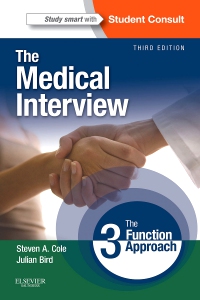
The Medical Interview, 3rd Edition
Paperback

Newer Edition Available
-
- Effectively meet a full range of communication challenges including language and cultural barriers, sexual issues, elderly patients, breaking bad news, and non-adherence
-
I. Three Functions Of The Medical Interview
1. Learning to Interview Using the Three Function Approach
2. Why Three Functions?
3. Function 1: Build The Relationship
4. Function 2: Assess and Understand
5. Function 3: Collaborative Management
II.Meeting the Patient
6. Ten Common Concerns
III. Structure of the Interview
7. Opening The Interview
8. Chief Complaint, Problem Survey, Patient Perspective, And Agenda Setting
9. History Of Present Illness
10, Past Medical History
11. Family History
12. Patient Profile And Social History
13. Review Of Systems
14. Mental Status
IV. Presentation and Documentation
15. Presentation and Documentation
V. Understanding Patients’ Emotional Responses to Chronic Illness
16. Understanding Chronic Illness: Normal Reactions
17. Understanding Chronic Illness: Maladaptive Reactions
VI Advanced Applications
18. Stepped-Care Advanced Skills for Action Planning
19. Chronic Illness
20. Health Literacy and Communicating Complex Information for Decision-Making
21. Sexual Issues in the Interview
22. Interviewing Elderly Patients
23. Culturally Competent Medical Interviewing
24. Family Interviewing
25.Troubling Personality Styles and Somatization
26. Communicating with the Psychotic Patient
27. Breaking Bad News
27 (a). Sharing Difficult or "Bad" News: A Nine-Step Transactional Process of Transformation
28. Disclosure of Medical Errors and Apology
29. Alcohol And Risky Drinking
VII. HIGHER ORDER SKILLS
30. Nonverbal Communication
31. Use of the Self in Medical Care
32. Using Psychological Principles in the Medical Interview
33. Integrating Structure and Function
Appendix
1: Table of skills
2: BAP Guide


 as described in our
as described in our 